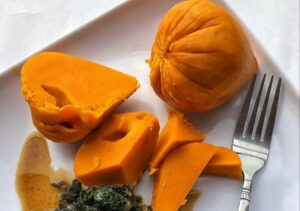Constipation is common during the dry season in Nigeria; when most people are easily dehydrated.
Other causes may include a poor diet, old age, medications, alcohol, lack of exercise, pregnancy, and illness.
Symptoms include hard or pebble-like stools, pain during bowel movements, a slightly swollen belly, fullness, loss of appetite, and inability to pass stool.
Also, some persons notice bright red blood on their stool or toilet paper after wiping which may be caused by tears (anal fissures) or hemorrhoids (piles).
Eating foods rich in fiber will keep the digestive system moving and reduce bowel emptying time.
Here are 10 Nigerian foods that can relieve constipation and keep you healthy.
10 Nigerian Foods For Constipation
1. Apples and Pears
Apples and pears are rich in fiber. One medium-sized apple or pear will give you about 5 grams of fiber.
They are rich in natural sugars; sorbitol and fructose, that help draw water into the intestines and get things moving along quickly.
You can eat them raw or add them to your salad or smoothies with their skins intact.
2. Papaya (Pawpaw)
Papaya is high in fiber and water. The high fiber absorbs water into the colon and softens the stool.
It also contains an enzyme called papain that promotes healthy digestion and improves gut health.
You can include papaya in your diet in a variety of ways. Eat them raw, or add them to your smoothies or salads.
3. Oranges
Citrus fruits like orange and grape are incredibly rich in fiber, vitamin C, and water.
Their skins contain pectin, a soluble fiber that pulls water into the colon – softening the stool and decreasing gut emptying time.
Make sure to eat the peeled fruits whole to maximize their fiber benefits.
4. Green Leafy Vegetables
Leafy veggies are incredibly rich in insoluble fiber, folate, vitamins, and antioxidants.
They add bulk and weight to stool, which eases constipation. You can add them to soups, stews, or eat them in salads.
The following are Nigerian vegetables that relieve constipation:
- Jute leaves (Ewedu)
- Pumpkin leaves (Ugu)
- Spinach
- Water leaf
- Bitter leaf
- Lettuce
- Okra
- Scent leaf
5. Garden Eggs
Garden eggs are nutritious and full of fiber. They promote digestion and bulk up your stool – making stool pass more easily.
You can eat them raw or toss them in your salads or stews.
6. Beans
Legumes like cowpeas (black-eyed peas), bambara nut, green peas, soybeans, and chickpeas are rich in soluble fiber.
1 cup of cowpeas will give you a whopping 11 grams of fiber, which helps to get your gut moving and relieve constipation.
You can include more legumes in your diet by making porridge, puddings, salads, and soups.
7. Oatmeal
Oats are a great source of soluble fiber called beta-glucan which helps in digestion, cholesterol, and more.
A half-cup serving of oats will provide you with about 4 grams of fiber.
Cook your oats with lots of water; to keep you hydrated and push things out quickly.
8. Whole wheat
Your regular whole wheat meal or bread is rich in insoluble fiber that adds weight to your stool and gets things moving.
Insoluble fiber is a type of fiber found on the outer skin of foods, it absorbs water, bulks up the stool, and alleviates constipation.
Eating 2 slices of whole wheat bread will provide you with about 3.8 grams of fiber, but ensure to take in lots of fluid with each bite.
9. Sweet potatoes
Sweet potatoes are an excellent source of soluble and insoluble fibers.
One medium-boiled sweet potato with skin has about 3.8 grams of fiber. They bulk up the stool and increase bowel movement.
Sweet potatoes are highly versatile. You can eat them raw, roasted, boiled, or baked.
10. Water
To help the fiber work better and avoid dehydration; drink plenty of water.
You can also drink natural fruit juices, clear soups, smoothies, vegetable juices, and hot beverages.
Just make sure to take in about 2 – 3 liters of fluids a day.
What to Avoid When Constipated
To treat and prevent constipation, avoid foods and drinks with little or no fiber, such as:
- Fast food
- Fried food
- Highly processed foods like white bread
- Chips
- Meat
- Alcohol
- Medications like opioids (codeine), iron supplements, antacids, and antidepressants.
Treatment
Lifestyle changes can help reduce the risk and relieve constipation. Examples of these changes include:
- Eating a healthy fiber diet
- Getting regular exercise (walking, taking the stairs, etc.)
- Not holding the urge to visit the restroom
- Reducing stress
- Regular hydration
- Avoiding certain medications
However, if you still feel constipated after making the necessary diet and lifestyle changes; your doctor or pharmacist may prescribe you one of the following laxatives:
- Bulk-forming laxatives, such as methycellulose (FiberCon)
- Water-retention laxatives, such as magnesium hydroxide (Milk of Magnesia)
- Stool softeners, such as docusate sodium (Docusate)
- Lubricants, such as paraffin oil
- Stimulants, such as bisacodyl (Ducolax)
The Bottom Line
Many foods like apples, pear, beans, garden eggs, and sweet potatoes can help alleviate constipation.
High fiber foods add bulk and weight to stools, soften them by drawing water to the colon, and improve bowel movement.
Always remember to drink plenty of water, exercise regularly, and eat lots of fiber foods when you have constipation.
- Akbar A, Shreenath AP. High Fiber Diet. [Updated 2021 May 9]. In: StatPearls. Treasure Island (FL): StatPearls Publishing
- Eating, Diet, and Nutrition for Constipation: niddk.nih.gov/health-information
- Treatment for Constipation: niddk.nih.gov/health-information/
- FoodData Central – U.S. Department of Agriculture
Don't Miss Any Wellness Tips!
Get new free and exclusive health tips delivered straight to your inbox!




